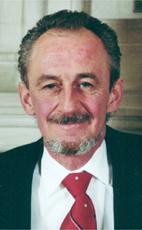Mr. Speaker, I would like to table a document and seek unanimous consent that the House ask the Ontario legislature to make our national capital, Ottawa, a bilingual city where both French and English are recognized.
 House of Commons photo
House of Commons photoWon his last election, in 2000, with 62% of the vote.
Points Of Order December 15th, 1999
Mr. Speaker, I would like to table a document and seek unanimous consent that the House ask the Ontario legislature to make our national capital, Ottawa, a bilingual city where both French and English are recognized.
Points Of Order December 15th, 1999
Mr. Speaker, to be fair, if members of the Bloc Quebecois have the right to ask for the unanimous consent of the House to table a paper, I believe that—
Points Of Order December 15th, 1999
Mr. Speaker, on a point of order.
I would like to tell the thousands of Quebecers and French Canadians across the country who are listening to us that, like all the Bloc members, I have a document in my possession. It is a report from the Standing Joint Committee on Official Languages asking that the city of Ottawa—
Kosovo May 3rd, 1999
Mr. Speaker, last Friday, Canada agreed to take in 5,000 Kosovar refugees whose living conditions have reached a critical stage in the crowded and unsanitary camps.
By its action, Canada is showing its solidarity with a population that needs much more than just moral support. Canada has clearly established that these people's lives were in danger where they were.
By taking concrete action, Canada is once again demonstrating its openness to other nations at times of crisis.
Any day now will see the arrival of people who are suffering greatly, and there is no doubt that what the government has said and done represents the views of all Canadians.
The spontaneous gestures and many expressions of support from Canadians are proof to the entire world of our concern for our fellow human beings.
Semaine De La Francophonie March 15th, 1999
Mr. Speaker, in this Semaine de la Francophonie, all Canadians should celebrate.
French speaking Canadians outside Quebec have every reason to be proud. By working hard to protect and promote the French language and culture, they give our country a truly Canadian identity.
Each Canadian province has to face different realities, but this concern to maintain high quality French is a plus for all Canadian culture.
The federal government contributes in various ways to support agencies or groups interested in stressing the importance of this Semaine de la Francophonie.
Bell Canada February 10th, 1999
Mr. Speaker, last year BCE, the mother company of Bell Canada, realized net profits of $1.6 billion after a raise in basic rates was approved by the CRTC.
The increase was supposed to finance enhanced services in rural Canada. In the meantime, in my riding of Timiskaming—Cochrane, 5,000 customers served by Northern Telephone, a wholly owned subsidiary of Bell Canada, are still on party lines.
Five thousand customers are still living in the fifties with party lines and rotary phones, which means no fax machines, no Internet and consequently no jobs.
Bell Canada, should be ashamed of itself. It benefited from a monopoly but failed to fulfill its responsibilities. Shame on Bell Canada. It made $1.6 billion in profits and instead of increasing services it laid off people.
I say shame on Bell Canada. I will continue to repeat this statement as long as the problem is not solved.
Francophones Outside Quebec February 8th, 1999
Mr. Speaker, the Bloc Quebecois claims that we are neglecting francophones outside Quebec.
I would like to ask the Secretary of State responsible for Western Economic Diversification what the government is doing to meet the needs of western francophones trying to make a success of it economically.
Heart Month February 2nd, 1999
Mr. Speaker, I am pleased to remind the House, and all the people of Canada, that February is Heart Month.
Health Canada has collaborated with the Heart and Stroke Foundation and the provinces in the Canadian Heart Health Initiative, in order to encourage Canadians to adopt a healthy lifestyle and to create living and working conditions conducive to healthy choices.
Canada has decided to adopt a public health-centred approach to the prevention of cardiovascular disease. Cardiovascular disease is the first-ranking cause of death, and one of the top causes of disability in Canada.
Canada has won some important battles in the war against heart disease and stroke, but there is still a great deal left to be done if we are to continue to reduce the risk factors relating to these diseases: high blood pressure, smoking, high cholesterol levels, and diabetes.
By investing in heart health, we can make a considerable reduction in the incidence of heart disease. And by encouraging all of society to make this investment, we will be able to improve the quality of life of countless numbers of Canadians.
Points Of Order November 25th, 1998
Mr. Speaker, what I wish to raise this afternoon is more a question of privilege.
I was elected by constituents who are bilingual, francophone or anglophone, to represent them in a bilingual parliament and in a bilingual country.
Every time I rise to speak in English in this House, the Bloc Quebecois members yell “Speak French!” at me.
It is not only my right and my privilege to speak both official languages in this House. It is my duty.
Norbert Reinhart November 25th, 1998
Mr. Speaker, Mr. Norbert Reinhart, a Canadian citizen and diamond driller from northern Ontario, is presently being held in captivity by the FARC guerrilla group in Columbia.
What is the Canadian government doing to ensure Mr. Reinhart's family and colleagues that every possible effort is being made to have him released safely and at the earliest possible time?